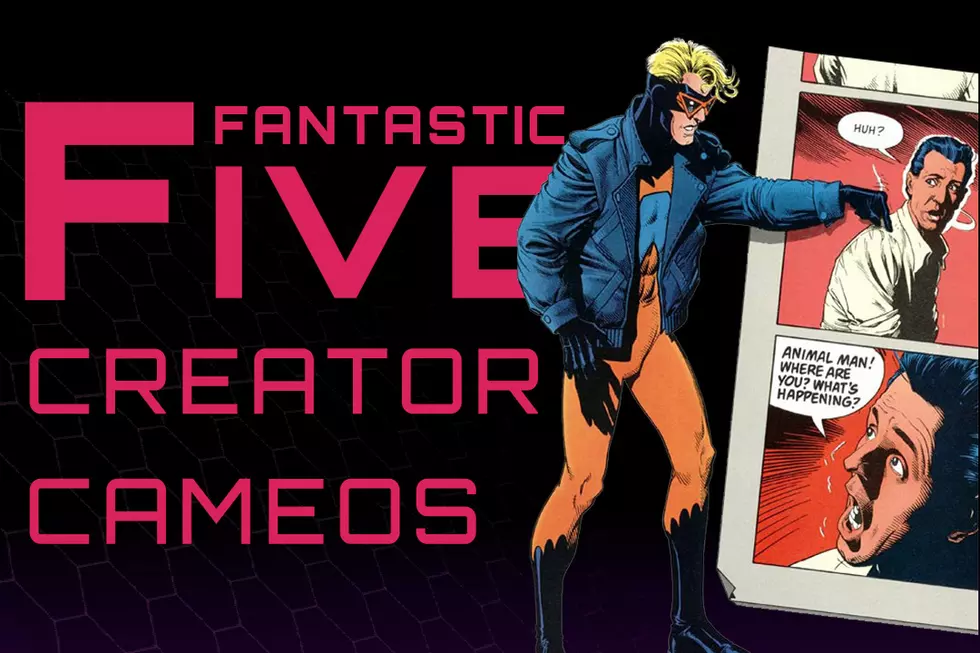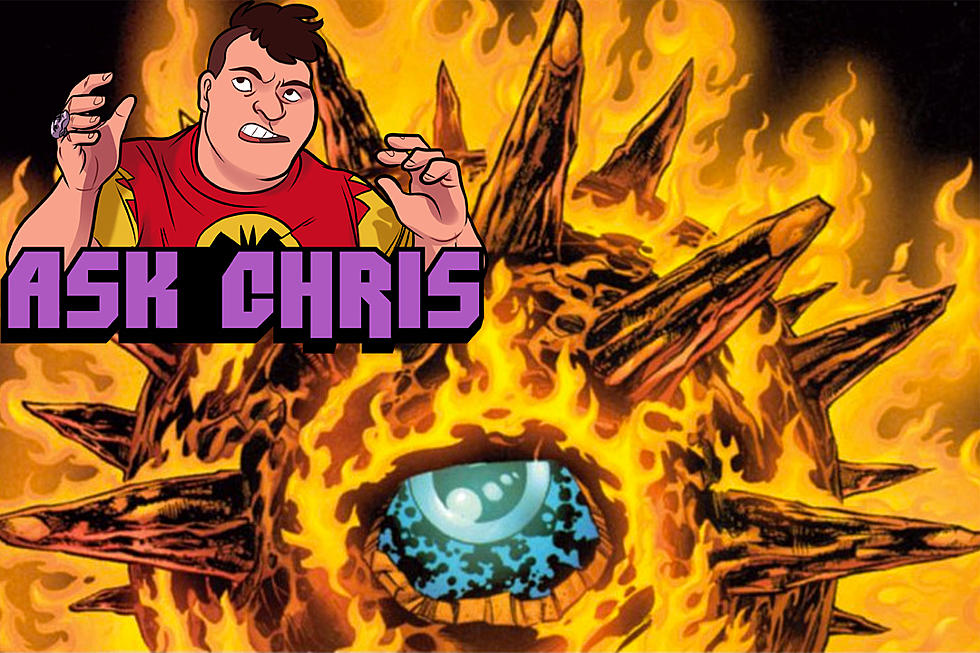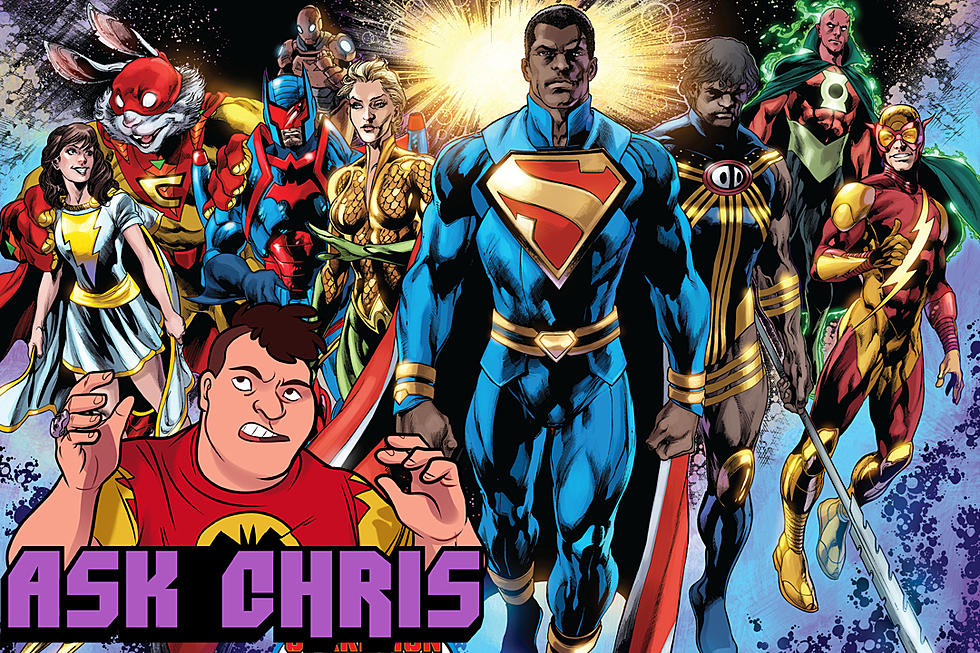![Irving And Morrison Out-Morrison Morrison In ‘Annihilator’ – And It’s Pretty Great [Review]](http://townsquare.media/site/622/files/2014/12/Anni00-630x420.jpg?w=980&q=75)
Irving And Morrison Out-Morrison Morrison In ‘Annihilator’ – And It’s Pretty Great [Review]
Outside of David Uzumeri, who spent a good portion of last week learning about Spiral Dynamics just so he could talk about Pax Americana in excruciating detail, I'm as big a fan of Grant Morrison as you're likely to find. For me, JLA, New X-Men, his seven year run on Batman and even the 11 issues of Aztek that he co-wrote with Mark Millar are easily on my list of the all-time greats. That said, if we're being completely honest with each other, I'm not that keen on his work outside of mainstream superheroes. I can take or leave The Invisibles, and The Filth didn't do much for me, and while I like Joe the Barbarian a lot, that book basically has Snake-Eyes from G.I. Joe in it, so it barely even counts.
As a result, I wasn't really paying attention to Annihilator, the book Morrison and Frazer Irving are doing through Legendary, until the aforementioned Uzumeri was singing its praises. Curiosity got the better of me, so today I sat down with the first four issues to see if it was worth all the hubbub, and the result was that I liked it a lot. It's a bizarre and compelling sci-fi epic where Irving is doing some of the best work of his considerably impressive career -- and on top of that, it is quite possibly the most Grant Morrison comic of all time.
Make no mistake: If you're not already a fan of Morrison's, this is probably not the book that's going to change your mind. In fact, I'd guess that if you're even a little tired of his signature tics and the themes that show up over and over again in his work, you're going to spend a lot of time rolling your eyes. I mean, I could not be stanning harder for this dude, and when I got to the end of the first issue and realized it was a story about a writer whose creation appeared in the real world in order to get him to save the universe with the power of fiction, even I had a smirk of Funky Winkerbeanean proportions. That's a story element he's been working with for coming up on 25 years, so seeing it here was not exactly surprising.
It was, however, pretty fantastic this time around. Which, I suppose, it usually is, if you're into that sort of thing.
In this case, the writer is one Ray Spass (pronounced "Space," because why wouldn't you name your character something that sounds a lot like laser beams from the heavens), a complete dirtbag of a screenwriter who has been using his past success to coast through a string of drug-fueled Satanic orgies and do lines of cocaine off a framed picture of his ex-girlfriend, who has a restraining order against him as a result of his complete dirtbag status. He has promised the studio his next script, but matters are somewhat complicated when he finds out that he has an inoperable brain tumor.
His script, incidentally, is called Annihilator, because of course it is, and it has what is possibly the best description of all time:
I'd watch that.
With that as the basic setup, we then get the two twists:
1. Everything he's writing about in his screenplay is actually the true life events of Max Nomax, an interstellar space criminal who was sentenced to a haunted prison orbiting a black hole for committing "The Ultimate Crime," and is now on Earth forcing Spass to recount his life back to him so that he can know what happened on the prison.
2. The tumor is (or at least seems to be) actually a sort of hyper-technological USB drive, a clump of data sent directly to his brain by Nomax that can only be excised from his head by channeling all the information into his screenplay, which he has to do in a week or else he'll die.
The whole thing is a thoroughly bonkers mashup of movie elements -- Spass is essentially living out a weird remake of Speed except the bus is a brain tumor -- centered around a screenplay that is itself a genre-bending mashup of clichés straining to be twisted into something new. It's described several times as "a haunted house in space," and is revealed at one point to be Spass's sci-fi twist on a forgotten pulp character that he's trying to repurpose for a new audience.
And on top of that, it's all constructed around a frame of Morrison's favorite plot elements. There's the whole fiction-as-reality thing that we've seen in The Invisibles and Multiversity, the wink-and-nudge references to Diabolik that we got in New X-Men, the idea of a character from another reality influencing the world by rippling through time that was in Batman: The Return of Bruce Wayne, and more. Once you start looking, you can see it all over the place, like a character swearing to conquer death itself through sheer force of will and the power of fiction.
Once you start noticing it, you can't really stop. It's almost like Morrison writing a parody of Morrison, except that it's great.
There's a part of this that comes down entirely to Irving. He and Morrison have always worked well together, but he's on some next level stuff here, juggling the otherworldly outer-space sections of the comic with Spass's ultra-scummy real life. The transitions between the two story threads, always done with a screenplay-style narration, are actually handled smoothly, and Irving pulls off the incredible trick of doing a story that feels "cinematic" without seeming like it's ever a movie pitch instead of a comic book story.
The story is, after all, built around movies. There are constant references -- the villain, Makro, is referred to at various times as being like both the Terminator and "an Oscar statue," though if you ask me he certainly favors the former -- and Irving's art reinforces that by employing plenty of cinematic tricks. Throughout the book, he's staging panels as though they're viewed through a fisheye lens, dropping visual cues lifted from films for dramatic effect, or breaking single panels up into "frames" that feel like a single shot:
It is, ironically, exactly the sort of thing that you can only do in comics, but here it's all built around reinforcing the idea that you're experiencing them through the window of another medium. It's a tough trick to pull off, but Irving's good enough that he does it in a way that seems effortless, blending the tension of outer-space horror with the comedy of Spass as a doomed screw-up who ruins everything he touches.
That, incidentally, might be the most difficult trick that Morrison and Irving pull off. Spass is an unrepentant douchebag, so to be honest, the seven-day deadline of his Johnny Mnemonic brain tumor/internal hard drive isn't really that much of an incentive to hope they succeed. There's a brief mention about saving the actual entire world, but other than that, there isn't much reason to care about whether Spass lives or dies. The thing is, the story is so compelling -- and told in such a compelling fashion -- that it's fun to read regardless.
Like I said, if you're not already into Morrison, I have a hard time believing that this is going to be the book that'll hook you, but there's so much well-done, unabashedly weird, over-the-top sci-fi imagery and storytelling involved that there's no way I can't recommend it to anyone. It's a hoot. A complex, self-referential, dimension-hopping cinematic hoot, and there's a ton in here to love.
Personally, they had me at "a haunted house in space."
More From ComicsAlliance









